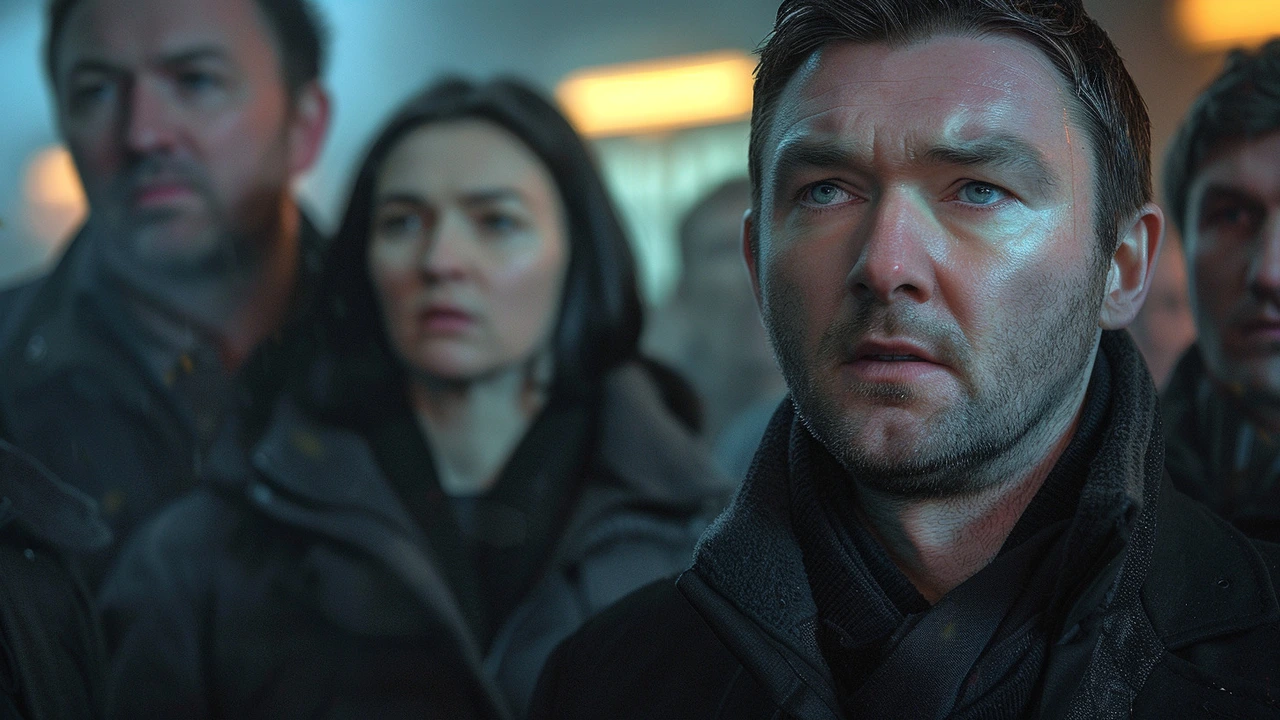Introduction to AppleTV+'s Dark Matter
'Dark Matter,' AppleTV+'s latest series offering, takes viewers on a riveting journey through multiple universes, blending psychological intrigue with the unfathomable depths of quantum physics. Based on Blake Crouch's best-selling novel, the show is a kaleidoscope of emotion and science, making it a standout addition to the multiverse genre. With Joel Edgerton at the helm playing the protagonist Jason Dessen, the series promises a cinematic exploration of life's infinite possibilities.
The Premise of Dark Matter
At the heart of 'Dark Matter' is Jason Dessen, a physics professor, portrayed with compelling depth by Edgerton. The narrative thrusts him from a comfortable, albeit uninspired, reality into a bewildering labyrinth of what-ifs. His journey across parallel universes begins with a simple, yet profound interruption to his regular evening—an abduction that diverts the course of his destiny. Each world he encounters is a mirror of what his life could have been, based on different personal and professional choices, challenging the viewer's understanding of fate and free will.
Cast and Characters
Edgerton's portrayal of Jason is both grounded and profound as he navigates the complexities of multiple selves. Alongside him, Jennifer Connelly delivers a stirring performance as Daniela, Jason's wife, whose alternate realities paint a compelling portrait of her unresolved aspirations. Their son, Charlie, played by Oakes Fegley, further adds to the emotional stakes, encapsulating the youthful innocence affected by the shifting tides of his parents' choices. Together, they form a relatable family unit thrust into extraordinary circumstances.
Early Episodes and Adaptation Challenges
The initial episodes of 'Dark Matter' focus heavily on setting the scientific and emotional groundwork, adhering closely to Crouch's narrative. This fidelity to the source material is double-edged; while it lays a solid foundation for the uninitiated, it also stumbles in pacing and clarity. Characters occasionally struggle to convey the profound science behind the plot, leading to moments of viewer confusion. Yet, this slow start is a common trope in series that tackle complex scientific paradigms and eventually, the series finds its rhythm.
Addressing Themes of Identity and Reality
As the series progresses, 'Dark Matter' shifts its focus from the foundational elements of the multiverse to more introspective explorations of identity and the human condition. What makes each life unique if the same person can lead countless different lives? The show delves into these existential queries with a mature narrative sophistication. The emotional resonance is enhanced by the backdrop of Chicago, with its iconic landmarks grounding the story's expansive themes in a recognizable reality.
Joel Edgerton's Dual Role
One of the series' most lauded elements is Edgerton's performance as the two versions of Jason. His nuanced portrayal of a man entangled in the web of his potential lives brings a palpable intensity to the screen. Each version of Jason is crafted with subtle but distinct differences, showcasing Edgerton's range and deep understanding of the character's psychological landscape.
Critique and Conclusion
While 'Dark Matter' does fall into some pitfalls common to adaptations and science fiction dramas, such as a ponderous start and complex jargon, it successfully recovers to provide a thought-provoking view on life's possibilities. The latter half of the series, where the narrative and character development truly take flight, offers a satisfying payoff to the viewer's initial perseverance. The series not only entertains but also invites introspection about the roads not taken, making it a valuable addition to the multiverse narratives in contemporary media.







12 Comments
Let me unpack the whole multiverse premise of "Dark Matter" in a way that even a casual viewer can digest: the series is essentially a dramatized thought experiment that forces us to confront the age‑old debate between determinism and free will, and it does so while sprinkling quantum decoherence jargon like confetti at a parade. First, the protagonist Jason Dessen is not merely a physics professor; he is a narrative device representing every scholarly attempt to impose order on a reality that fundamentally refuses it. The show’s early pacing, which some critics have labelled sluggish, is deliberately calibrated to mirror the slow, painstaking process of scientific inquiry, where hypotheses are tested over years before any meaningful breakthrough emerges. Moreover, the multiple universes function as a visual metaphor for the many‑worlds interpretation of quantum mechanics, where each decision spawns a branch reality-an idea that traces its intellectual lineage back to Everett’s 1957 thesis. By repeatedly juxtaposing the “what‑if” scenarios, the series forces us to ask whether identity is a static essence or a fluid construct shaped by cumulative choices. The emotional undercurrents-particularly the strained marriage between Jason and Daniela-serve as a poignant reminder that even in a hypothetical quantum landscape, human relationships remain the most intractable variable. As the narrative progresses, we witness a gradual shift from exposition‑heavy dialogues to more nuanced character studies, indicating a deliberate pacing strategy that rewards patient viewers with richer thematic payoff. The use of Chicago’s iconic skyline is not an aesthetic afterthought; it anchors the speculative narrative in a tangible geography, reinforcing the series’ claim that the extraordinary is merely the ordinary observed through a different lens. Joel Edgerton’s double portrayal exhibits a subtle differentiation in vocal cadence and posture, making each Jason feel like a separate phenomenological instance rather than a simple costume change. While the series does stumble-occasionally slipping into technobabble that could alienate lay audiences-the overall trajectory demonstrates a commendable ambition to blend high‑concept science with accessible drama. In short, "Dark Matter" invites us to contemplate the multiplicity of selves we could become, urging viewers to reckon with the latent potentialities embedded in every mundane decision we make today.
Yo, the series is a kaleidoscopic carnival of quantum chaos, and honestly, the scriptwriters must have been sipping some wild‑blue potion to conjure such a psychedelic tapestry of alternate lives. The way they sprinkle astrophysical lingo like candy on a parade float is both flamboyant and, dare I say, a tad pretentious, but it makes the whole thing feel like a high‑octane rollercoaster through the multiverse. If you’re not tripping over the jargon, you’ll appreciate the visual fireworks that burst every time Jason jumps into a new reality-pure cinematic dynamite.
Oh my god, the emotional roller‑coaster on this show is literally unbearable! Every time Jason slips into another reality, my heart does a somersault, and I’m left clutching my chest like I’ve just watched the final episode of a soap opera. The way the actors bleed for their characters is nothing short of theatrical brilliance-seriously, my eyes were watering for the third episode in a row, and that’s saying something when I’m usually a stone‑cold viewer.
For anyone feeling a bit lost with the early scientific exposition, the show does a solid job of gradually introducing the core concepts without overwhelming the audience. The character dynamics, especially between Jason and Daniela, are portrayed with subtle nuance, making each alternate timeline feel distinct yet familiar. If you focus on the relational arcs, the series becomes a compelling exploration of how choices shape personal identity.
Honestly great series no fluff.
While some hail "Dark Matter" as a triumph of speculative storytelling, one might argue that its relentless pursuit of philosophical depth borders on pretentiousness, especially when the dialogue veers into pseudo‑metaphysical babble that feels more like a contrarian’s manifesto than genuine inquiry. Still, the series does manage to surface some genuine questions about the nature of self.
Oh dear, let us not forget that while the series flirts with high‑brow scientific concepts, it also slips into moralizing territory-implying that every choice leads inevitably to a predetermined destiny, which is, frankly, a rather simplistic worldview! Yet, kudos to the creators for daring to tackle such intricate subject matter; still, a more balanced representation of chaos versus order would have enhanced the narrative.
Sure, the show tries to be deep, but honestly, it’s just a slick sci‑fi drama with flashy effects and a lot of jargon to impress the casual viewer. The plot moves at a snail’s pace at times, and the characters often sound like they’re reciting a textbook rather than having a real conversation.
Enough with the snark-"Dark Matter" actually delivers a bold, inclusive message about embracing alternate possibilities and refusing to be boxed in by a single narrative. The series challenges viewers to think beyond conventional limits and celebrates the diversity of human experience across countless realities.
It is commendable how the series intertwines scientific intrigue with motivational storytelling, encouraging viewers to reflect on their own life choices and the myriad paths that could have unfolded. The formal structure of each episode, complemented by inspiring character arcs, offers both intellectual stimulation and emotional uplift.
The cultural fabric woven into the series cannot be ignored; by situating the multiverse narrative within Chicago, the creators ground the speculative elements in a recognizable reality, thereby fostering a dialogue between the everyday and the extraordinary. This approach asserts the series as not merely entertainment but a philosophical discourse on identity.
Fantastic series!